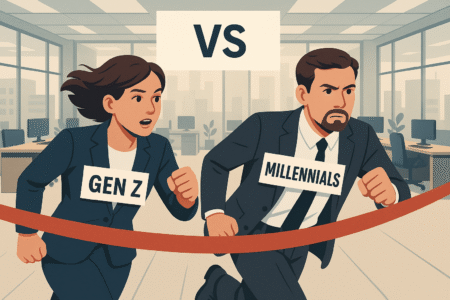The modern office isn’t just about KPIs, Zoom calls, or water cooler chatter anymore. It’s become a quiet battleground — not of job titles or pay grades, but generations. In one corner, we have the Millennials — the side hustle warriors, the burnout romantics. And in the other, Gen Z — the boundary-setting, capitalism-questioning digital natives. What we’re witnessing isn’t just a shift in work culture — it’s a clash of values, vibes, and vocab. The Rise-and-Grind Millennials Born between 1981 and 1996, Millennials came of age during recessions, layoffs, and an economy that taught them one thing: survival means submission. So, they worked. Hard. Overtime was a badge of honor, not a red flag. They worshipped at the altar of hustle culture, turned productivity into identity, and saw their desks as second homes. They believe in loyalty, in climbing the ladder — and yes, in perfecting the art of the passive-aggressive “Just circling back…” email. The Boundaries-First Gen Z Enter Gen Z, born post-1997, into a system already broken — and unapologetically vocal about not fixing it with silence. They watched Millennials get crushed under toxic work norms and said: “No, thanks.” They came armed with therapy-speak, digital fluency, and work-life balance as a non-negotiable. For Gen Z, staying late doesn’t mean dedication — it signals poor management. And if the job doesn’t align with their mental health? They’ll quit on a meme. They communicate with soft language (“no pressure if not :)”) and sharp clarity. They don’t live to work — they work so they can live. Cold War or Culture Clash? The tension between the two isn’t loud. It simmers in Slack threads, sarcastic Instagram reels, and that subtle tone shift in office emails. Millennials think Gen Z lacks grit. Gen Z thinks Millennials glamorize suffering. It’s a silent war of survival vs evolution. Where Millennials endured the system, Gen Z is actively trying to dismantle it. Millennials adapted. Gen Z is disrupting. Lost in Translation This generational divide shows up in language, too: And the miscommunication isn’t just verbal — it’s emotional. Millennials see professionalism as restraint. Gen Z sees it as authenticity. Cue the collaboration breakdowns and passive Slack shade. So… What Now? Let’s be real — this conflict isn’t productive. Because when you zoom out, both generations are fighting the same system. Just with different weapons. Millennials brought us remote work, digital transformation, and the rise of freelancing. Gen Z is bringing us emotional intelligence, cultural accountability, and flexible-first thinking. Put them together? You get a workplace that’s not just functional — but future-ready. Final Thought This isn’t about who’s right. It’s about what’s next. The future of work isn’t generational. It’s intentional. And maybe, just maybe, the office doesn’t need another “OK Boomer” meme or an email about “office culture.” What it really needs is a conversation. So before you roll your eyes at that Gen Z intern who clocks out at 5 sharp — or scoff at that Millennial manager with ten color-coded calendars — pause. Ask a question. Share a story. Start a dialogue. Because the real enemy isn’t each other. It’s a work culture that still confuses exhaustion for excellence. Keep Reading Foramz for your daily dose of moral support.
Social media is a mirror in today’s digital world, but it is a mirror that never accurately represents our true reflections; it always represents a filtered, edited, and curated version of life. For Generation Z (1995 – 2010), however, this mirror is nearly impossible to avoid. Social media is a part of everyday life, from taking Instagram selfies and TikTok dances to Snapchat streaks and aesthetic boards on Pinterest. But in the middle of all of the likes, followers, and hashtags is the growing concern of the pressure to be perfect, and how that pressure negatively influences self-esteem. For many Gen Zers, social media is more than just a form of screen time; it’s a lifestyle. Research tells us that teens and young adults average three to six hours a day scrolling their platforms of choice. Entertainment, connection, and creativity are just a few of the beneficial aspects of social media, but they also include an intense sense of comparison. The cycle starts innocently: you post a photo, wait patiently for likes to come in, and get flooded with that feel-good rush as the hearts come rolling in. In no time, you start to wonder why there are so many others with clearer skin, better fashion sense, or more interesting lives, or bigger circles of other fun people. It’s crazy! Logically, we know that all of those images are filtered, curated, posed, or crafted, but we can’t help the compulsion to compare. These constant comparisons lead to feeling inadequate: “Why isn’t my life as cool?” or “Why don’t I look like that?”. Little by little, these thoughts strip away at our self-esteem, especially when we are still figuring out who we are. Social media’s greatest detractor is that it depicts little of reality. Social media’s dark secret is that the people we follow typically only post their best experiences, the amazing vacations, the perfect selfies, and the beloved celebrations. As a result, we are left with this social media highlight reel that glosses over the messy, mediocre, boring, and mundane. Consequently, scrolling through hundreds of highlight reels each day can lead to the perception that everyone else is doing better than us. This can also contribute to feelings of anxiety, depression, and a skewed sense of self-worth. Gen Z is accustomed to this kind of pressure because social media has been prevalent in their lives since they were toddlers. A survey conducted by the American Psychological Association revealed that Gen Z participants experience the highest levels of stress compared to previous generations, with social media contributing much to the angst. A lot of teens feel they have to perform look perfect, act cool, be on-trend just to stay META! Technology has made changing your appearance only with a few taps to the screen, easier than ever filters can slim down your face, whiten your eyes, and smooth out your skin. Editing apps can transform your photos within seconds to help you look like a model. Some people just enjoy playing around with these tools, while others feel compelled to utilize them just to feel “good enough” to share a post. This creates a toxic cycle of insecurity. You might share an edited photo, receive some compliments, and briefly feel good. However, when you look in the mirror, you feel disappointed, not meeting the transformative “you” that you created online. What can be done? To begin with, it’s worth remembering that social media is not reality. Behind each perfect post is someone with just as many struggles, insecurities, and bad days as you have. Unfollowing accounts that make you feel awful about yourself, stepping away from social media, or setting screen-time limits are all great ways to help protect your mental health. Following influencers who embody body positivity, mental health awareness, and being yourself is helpful too. There are more and more Gen Z influencers who are vocal about the negatives of filters and the importance of showing up as your true self. These are all great steps in changing social media culture. Speaking to friends, family, or even a counselor about your feelings can be hugely beneficial too. You are definitely not alone in feeling the pressure, and it is completely okay to ask for help. Perfection is a myth and not the goal. What matters is finding yourself, and realizing that everyone has flaws even those who look perfect on social media. Gen Z has the chance to change how social media is used and can do so by being honest, supportive, and kind. In the end, you are not defined by the number of likes, or followers, or filters that you have. You are defined by how you respect yourself, and how you respect others. Social media can be a fun tool, just don’t let it define your self-worth. You are enough. Keep reading foramz
Take a walk through a college campus, a metro station, or a coffee shop, and you’ll notice one thing in common Gen Z is almost always plugged in. Whether it’s music, podcasts, or ambient sounds, there’s a non-stop stream of audio flowing directly into their ears. Headphones have become more than a gadget. They’re an identity, an escape, and for some, a survival mechanism. But here’s a question arises that no one’s asking loudly enough: What is this constant soundscape doing to their mental and physical health? The 24/7 Audio Loop For Gen Z, silence has become uncomfortable. Many can’t fall asleep without white noise or “sleepy” Spotify playlists. Studying? That requires lo-fi beats or dark academia instrumentals. Even social media apps are audio-forward from TikTok sounds to voice notes. This creates a dangerous reality: the brain rarely gets a moment of pure silence. Experts are raising concerns. neurologists warn “The brain is not designed for non-stop stimulation. Young adults who are constantly plugged in are showing early signs of attention fatigue and reduced emotional resilience.” Hearing Loss Is Hitting Early Headphones might seem harmless, but loud volumes over long durations are a recipe for irreversible damage. According to a recent WHO report, over 1 billion young people worldwide are at risk of noise-induced hearing loss due to unsafe listening habits. What’s worse? Most Gen Z listeners don’t even realize they’re turning the volume up too high. Noise-cancelling headphones, a Gen Z favorite, create an illusion of safety. But many crank up the volume to overpower environmental sounds, exposing their ears to 85+ decibels for hours on end enough to cause permanent hearing loss. Ringing in the ears is no longer just an old person’s problem. It’s showing up in teenagers. And it’s more than just annoying it leads to sleep issues, anxiety, and even depression. Escape or Avoidance? Beyond physical health, there’s a bigger, more emotional question: Why is Gen Z so desperate to stay plugged in? Part of it is the desire to create a personal bubble a way to feel in control in an increasingly chaotic world. But this bubble often becomes a wall. Headphones are becoming tools for social avoidance. Eye contact is lost. Conversations are skipped. Silence is feared. This kind of emotional detachment can lead to loneliness, social anxiety, and difficulty navigating real-world relationships. In a paradoxical twist, Gen Z the most connected generation in history is increasingly disconnected in real life. Can We Unplug? The solution isn’t to throw out the headphones. Music, podcasts, and audio spaces have enormous power they inspire, educate, and even heal. But like all powerful tools, moderation is key. Most importantly, reconnect with the sound of silence. Listen to your surroundings. Engage in a real conversation. Let your brain breathe. Because sometimes, the most powerful moments happen when the music stops. Keep reading foramz for your daily dose of emotional support.



